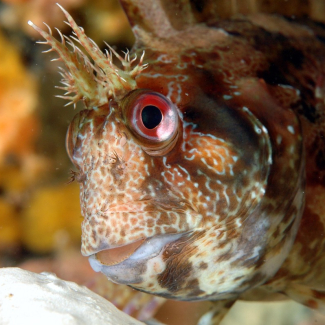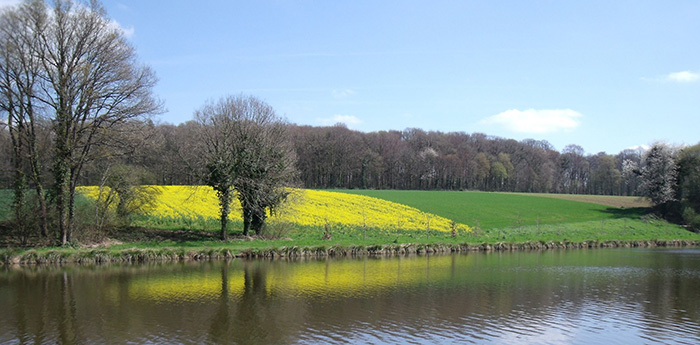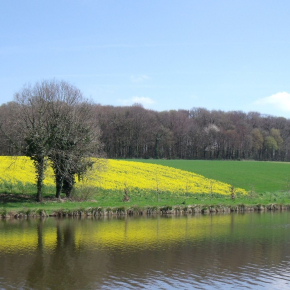
CNRS coordinating collaborative project for profitable agriculture without synthetic pesticides
|
|
Greatly reducing the agricultural world’s dependence on synthetic pesticides (SPs) harmful to the environment and human health alike, while ensuring that farms remain profitable, is the aim of the ENVEZH project. Coordinated by the CNRS and co-designed with the intercommunal Oust River Basin water management authority (Syndicat Mixte du Grand Bassin de l’Oust), this ambitious initiative mobilizes a wide array of actors in Centre-Bretagne to implement innovative food industry supply chains that use few or no SPs. ENVEZH is financed through the France 2030 programme for food industry transition regional pilot projects (Démonstrateurs Territoriaux des Transitions Agricoles et Alimentaires), run by the Banque des Territoires on behalf of the French government. The project kicks off on 22 March in Ploërmel (Morbihan, Brittany).
The contamination of water sources by synthetic pesticides (SPs) is a major environmental and public health issue. Though alternative solutions exist, they are usually associated with lower yields for farmers. Near urban centres, this loss can be offset through short supply chains that more closely link producers and consumers, cutting costs associated with intermediaries, and through active support from the public sector, including produce orders for canteens serving public institutions. But such options do not exist in areas designated ‘deep-rural’, which are far from urban centres and demand innovative SP alternatives.
Endowed with a total budget of €18.8 million, the ENVEZH1 project seeks to demonstrate that the obstacles faced by farmers in these regions can be surmounted by reliance on long food industry supply chains2 . ENVEZH is coordinated by the CNRS3 , jointly designed with the intercommunal Oust River Basin water management authority (Syndicat Mixte du Grand Bassin de l’Oust), and funded through the France 2030 programme4 for food industry transition regional pilot projects (Démonstrateurs Territoriaux des Transitions Agricoles et Alimentaires)5 , which is managed by the Banque des Territoires for the French government. It is the first French initiative in a deep-rural region to involve all public- and private-sector players participating in long food industry supply chains6 : local authorities, food industry firms, technical institutes, the chamber of agriculture, agricultural educators, associations, and scientists, constituting a laboratory for action and reflection unprecedented in its scope.
ENVEZH has several goals: to assist food industry players in the development of innovative low-SP or SP-free supply chains; to support farmers as they integrate these supply chains while preserving, or even increasing, profits; and to massively reduce soil and water pollution due to SP use. Ultimately, the aim is to replicate the project on a national scale by setting up such supply chains across the country.
ENVEZH activity will be based within the Oust River Basin, between the town of Rennes and Vannes in Brittany, where water sources are highly contaminated. The success of ENVEZH will depend on the greatest possible number of farmers integrating the new supply chains proposed by the project, including SP-free supply chains for swine feed and a milling wheat supply chain, which uses substances extracted from marine algae instead of fungicides and insecticides. Officially launched on 22 March 2024 in Ploërmel, ENVEZH will begin with a 16-month maturation phase supervised by the CNRS before becoming fully operational for a 5-year period.
The ENVEZH project addresses societal challenges within the categories ‘Regions of the Future’ and ‘Health and Environment’ defined in the CNRS’s performance and objectives contract. Because of its impartiality with respect to agribusiness interests, the CNRS is seen as a guarantor of balanced interactions by members of the ENVEZH consortium, some of whom are business competitors. It will also have a hand in the initial profiling of SP use within the region and of the water quality footprint of SPs there. In addition, the CNRS will play a key role in the implementation of strategies for assessing the impact of ENVEZH actions.

© Patrice Cotinet.
- 1The full name of the ENVEZH project is the Alliance Bretonne pour une Réduction Massive de l’Usage des Produits Phytosanitaires de Synthèse en Agriculture et un Déploiement Accéléré de l’Agroécologie (Breton alliance for a massive reduction in the agricultural use of synthetic pesticides and an accelerated transition to agroecology).
- 2Long supply chains include many specialized intermediaries between producers and consumers: wholesalers, distributors, retailers, and others. In contrast, short supply chains have no more than one intermediary between producers and consumers, one example being the community-supported agriculture (CSA) model.
- 3This coordinating role is entrusted to the Géosciences Rennes research laboratory (CNRS / University of Rennes) and OSUR, the Rennes Earth Science and Astronomy Observatory (CNRS / University of Rennes / Rennes 2 University).
- 4The purpose of France 2030 is to accelerate the transformation of key sectors of the French economy through innovation and to make France not just an actor, but a leader, in tomorrow's world. For more information: https://www.gouvernement.fr/france-2030
- 5ENVEZH is a winner of the France 2030 Démonstrateurs Territoriaux des Transitions Agricoles et Alimentaires call for expression of interest. It is the only one of the currently 15 accredited projects coordinated by the CNRS.
- 6ENVEZH is a partnership of 26 entities, including local authorities, food industry firms, providers of agricultural support services, engineering firms, research laboratories, technical institutes, training institutes, and associations representing local residents.


